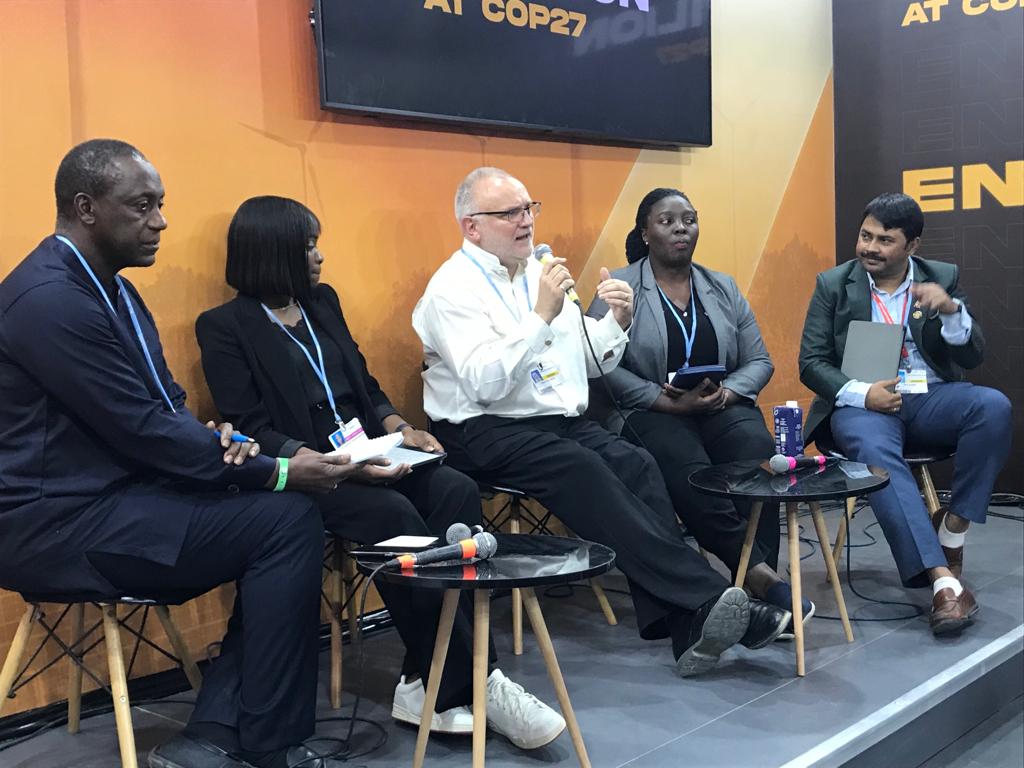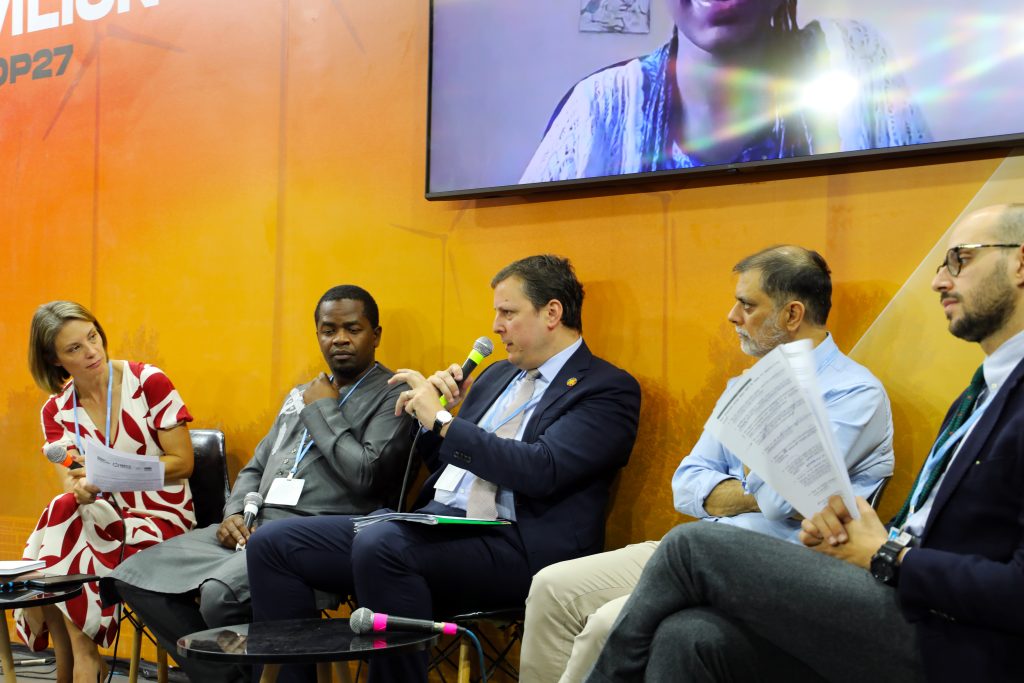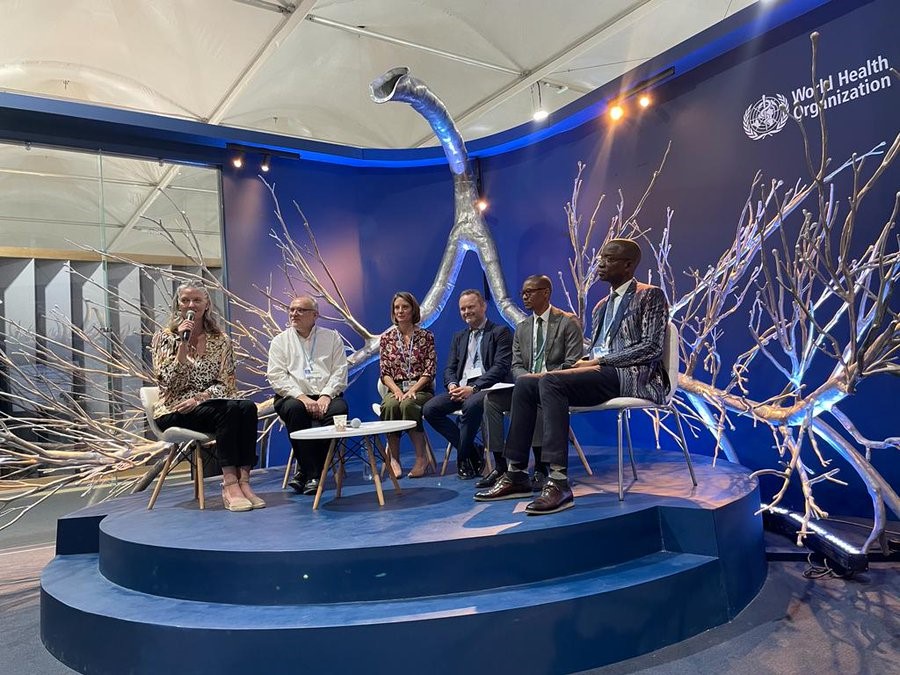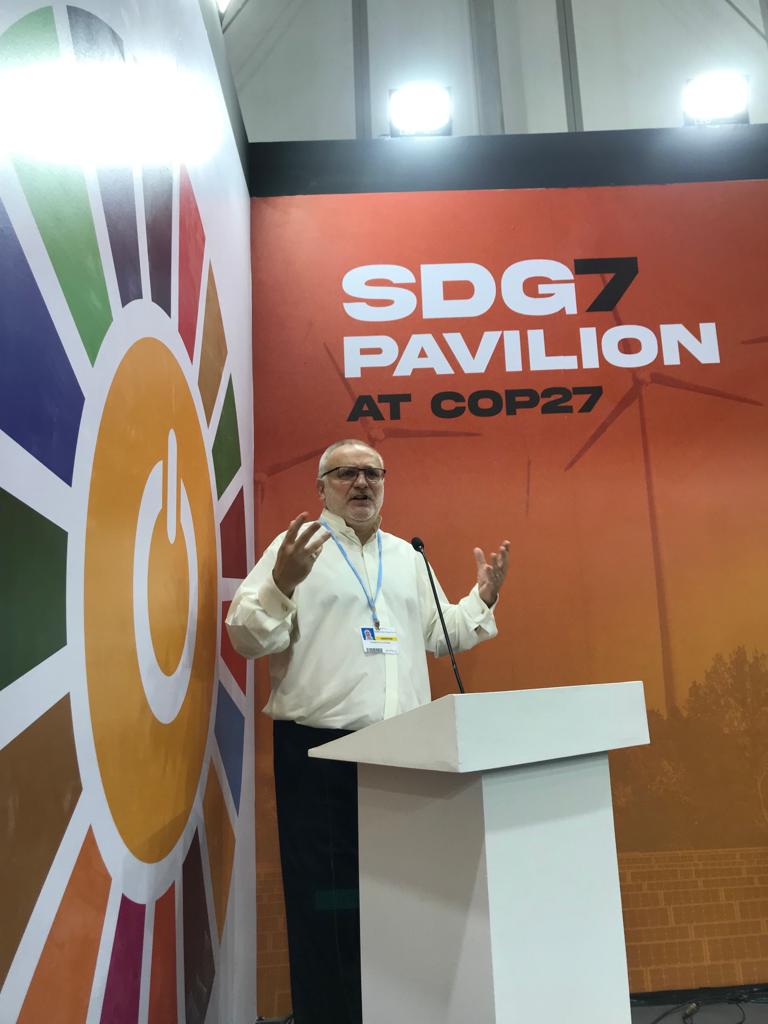
- Date
- 9th December 2022
- Categories
By Prof. Ed Brown (Loughborough University, UK)
Even with a very small delegation, MECS and our partners had a strong presence at COP27 and we were delighted to see the modern energy cooking agenda being discussed widely across many sessions. There was a particular focus on the growing understanding of the opportunities that electric cooking (eCooking) provides for the dramatic scaling of affordable modern low carbon cooking.
Our showcase event was the extended all morning session ‘The Twin Opportunity: Electricity Spurring a Clean e-Cooking Transition’ co-organised by MECS and Sustainable Energy for All (SEforALL) which was held in the SDG7 Pavilion on 12 November. During this extremely well attended session, Daniel Schroth, Acting Director of Renewable Energy and Efficiency at African Development Bank (AFDB) explained how they are excited about the opportunities for eCooking, seeing eCooking likely to be incorporated across their energy access work within the next five years: “In 5 years I would like to see electric cooking move from being a niche to becoming a mainstream, and that’s the real advantage of eCooking, that we can mobilize a lot of climate finance into clean cooking because there are no questions around the non-clean parts”.

We were also delighted to hear from other major voices in the sector, e.g. Zeph Kivungi from Global Energy Alliance for People and Planet (GEAPP) who stated: “I would like to see in 5 years having this shift to become a norm, because firstly, it makes business sense, and secondly, it’s already been proven beyond doubt, and this is something that everybody should be doing”. Ash Sharma from The Nordic Environment Finance Corporation (NEFCO), also spoke in the same session detailing how NEFCO’s Modern Cooking Facility for Africa (MCFA) will be supporting a range of companies offering electric cooking appliances under their first round of applications.
There was also a strong focus on the potential of eCooking during a session held in the Health Pavilion which focused on the role of modelling tools in illustrating the costs and benefits (relating to health, environment, climate, economy, etc.) of different approaches towards the scaling of clean cooking. Ed Brown took the opportunity to outline the eCooking market assessment work that MECS has been doing with EnDev across a wide range of countries over the last year. The session received some excellent coverage in the press including this wonderfully insightful piece by Elaine Ruth Fletcher.

There were also lots of opportunities to hear first-hand about progress on eCooking in individual countries across a number of different sessions. MECS’ collaboration with the Kenyan Ministry of Energy on the first ever National eCooking strategy anywhere in Africa was the focus of a collaborative session between MECS and our sister programme Climate Compatible Growth (CCG), as part of CCG’s week long series of side events. The session explored issues surrounding the use of data, market development, and activities which were developed with Kenya Power and Lighting Company (KPLC) and the funding of the strategy.
The second session of our SDG7 Pavilion event included detailed discussions of the prospects for eCooking in Kenya, where we were delighted to welcome our guest, Dr Faith Wandera-Odongo from Ministry of Energy, Kenya who discussed Kenya’s plans for preparation and implementing an eCooking strategy by 2028, making eCooking mainstream. Nigeria, Nepal and Malawi, were also amongst countries in the detailed discussions. The discussions continued in more depth in a closed-door workshop in the Climate Challenge lab at the Climate Innovation Zone with a particular focus on Mozambique. We were also involved in another fascinating session on Malawi in the SDG7 Pavilion on 15th of November. This session, ‘Data-driven Transitions: A Spotlight on Malawi’s Ambitious Access and Transition Plans’, featured discussions of the recently announced Integrated Energy Plan for Malawi conducted by SEforALL, which MECS will also be collaborating with on the eCooking dimensions, under our new partnership with SEforALL .
The session also outlined the Global Energy Alliance for People and Planet’s (GEAPP) support for the rapid expansion of generation capacity in Malawi, the grid-scale storage facility which will be accompanied by eCooking and will be integrated into the services offered to thousands of the newly connected communities to the grid. Our colleague, Long Seng To who leads MECS’ work on Humanitarian Energy, is currently visiting both Malawi and Mozambique and will explore further how MECS can support the adoption of eCooking within both countries’ contexts, building on the connections established at the COP.
These developments in Malawi are truly exciting and illustrate the argument that we have been making for some time now; that the best prospect for dramatic scaling of low carbon cooking lies in the integration of eCooking into electrification planning. It is wonderful to see organisations like AFDB and GEAPP are embracing this potential, and we will be working with them and other similar organizations in turning interest and advocation into concrete plans, strategies, and projects with budgets!
This focus on finance was also the central point of another collaborative session between CCG and MECS which also featured Ash Sharma, Ed Brown and Faith Wandera-Odongo from Ministry of Energy, Kenya, alongside Professor Alex Money from Oxford University. This collaborative session included a wide range of discussions over the role of climate finance in support of modern energy cooking initiatives – another massively important component to the scaling of eCooking. Our work in this area was highlighted in several sessions, with particular reference being made to the new revised gold standard methodology for metered cooking devices which was launched at COP.

Given that Ed was the only staff member of the MECS team to be in Egypt, it was incredibly encouraging to see so much discussion of the potential of eCooking across so many different sessions at COP. The electric cooking revolution seems well and truly underway.
PS. Many of the leading voices advocating for modern energy cooking over the last decade came together via an organisation called the UK Low Carbon Energy for Development Network (LCEDN) which spear-headed the development of an amazing set of collaborations between different branches of academia such as researchers from North and South, research communities, policymakers, large and small-scale businesses, NGOs, and financiers. Central to the LCEDN was the formation of long-term partnerships and effective equal relationships. A few of us came together during COP to discuss how a renovated LCEDN might emerge at the current juncture and how it might nurture collaborations across UK Aid’s supported research programmes and the wider academic, business and policy communities.
For further information on this see here and here
Featured Image: Image credit SEforALL